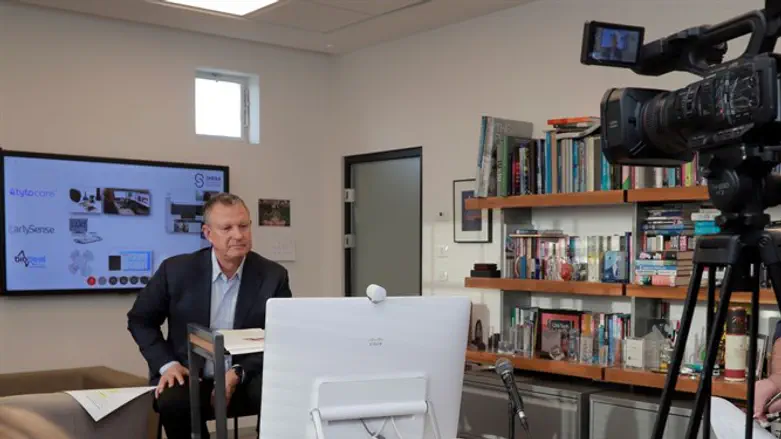
Jerusalem Venture Partners (JVP) Founder and Chairman Erel Maraglit today convened an emergency "wake up call" bringing leaders from the fields of government, health, technology, and economics from around the world to address the role of innovation and startups in combating the COVID-19 crisis.
In the first of its kind virtual conference, medical and policy experts discussed and shared best practices and methods for using innovation in diagnostics, prevention, treatment, and more. Participants issued a call for "more proactive synergy" between governments and world leaders, including global data sharing.
Margalit, with decades of success in creating multi-disciplinary centers of excellence and business hubs, is now building an international online ecosystem, comprising public and private sectors, academia and business, as well as health and tech sectors, to contribute to the fight against COVID-19.
Margalit said, “We're situated in different countries. Let us remember that the only way this will be contained is for the leaders to work together to coordinate strategies and best practices between countries. It is the only way to be effective.”
The discussion addressed four main challenges currently at the heart of the debate around the required restructuring and adaptation of public health systems during times of crisis.
1. Developing quicker and more cost-effective diagnosis and prediction tools
2. Advancing remote care mechanisms
3. Promoting treatment and prevention
4. Using data to provide a BI system in crisis
In the fields of policy and government, speakers included: Davide Falasconi, Chief Innovation Officer of Italy; Dr. Eran Zehavy, Chief Innovation Coordinator at the Israel Institute of Biological Research; Lindsay Clinton, Executive Vice President, Industry and Innovation Group New York City Economic Development Corporation. Scientific, academic, and medical experts included: David Zigdon, CEO Migal Research Center; Prof. Eran Segal of the Weizmann Institute of Science; Professor Ofer Marin, CEO Sharee Zedek Medical Center in Jerusalem; Dr. Galia Barkai of Sheba Tel Hashomer Medical Center; and Dr. Nirav R. Shah MD, of Stanford University. Industry heads and leading startup representatives including: Oren Sagi, General Manager of Cisco Israel; Ohad Goldberg, General Manager of AstraZeneca Pharmaceutical in Israel; Kamal Ghribi, Chairman GK of Investment and Chairman GSD HealthCare which operates hospitals in Italy and across the Arab world; Amir Haramaty, COO of SparkBeyond; Arik Eisenkraft Chief Medical Officer at Bio Beat; Dedi Gilad, CEO of Tyto Care; Eran Eden, CEO of MeMed; Inder Singh, CEO of Kinsa; and Elad Ben Meir, CEO of Scadefense.
Davide Falasconi, Chief Innovation Officer of Italy described the situation facing his country, saying “We are facing a situation which has never happened before. But it is not only an Italian issue. We have some regions which are incredibly under pressure.” Pinpointing some of the technological steps being taken to improve the situation, he said “We are enabling digital services to provide their services for free” for the benefit of companies and residents.
Lindsay Clinton, Executive Vice President, Industry and Innovation Group New York City Economic Development Corporation outlined the situation in New York, which she noted is now considered to be the center of the pandemic in the United States. She said, “Our priorities are identifying additional hospital and medical space, identifying additional availability of medical supplies and additional staff.” In particular, she described efforts to develop a local ecosystem of decentralized production for much needed face shields, isolation gowns, ventilators and other essential items. She described the enthusiasm of local producers, saying “Within 24 hours of issuing a call, we had prototypes of face shields and other items.”
Dr. Eran Zehavy, Chief Innovation Coordinator at the Israel Institute of Biological Research, outlined the institute’s efforts to develop a vaccine. He said, “We started to see in early January that this virus would be a serious problem. Luckily we arranged lots of tools in early January. So, when we received the order to work on vaccine development, we were already somewhat prepared. We started to shift all our research towards that target, and we already have very encouraging results.” He noted that “We are trying as much as possible to collaborate,” specifying that his institute had signed agreements with three companies, including two start-ups.
Dr. Galia Barkai of Sheba Tel Hashomer Medical Center in Israel noted that the hospital was the first in Israel to treat coronavirus patients, from the Diamond Princess cruise ship. She said, “This corona crisis made us harness technology. We had to build a facility with minimal physical contact – This is not in our DNA. We placed patients inside the facility, the staff were outside in an inflatable tent with all the monitors and other equipment. It enabled physicians to do everything they needed to do while protecting staff from being infected.”
Dr. Nirav R. Shah MD, of Stanford University commented, “The virus is evolving. This is a twenty first century disease. We need to arm ourselves with twenty first century tools. We need to do what Twitter did to the news cycle – Make it real time and democratic” so that medical solutions are more widely available and impactful.
Today’s webinar, on Cisco’s Webex platform was the first in a series of virtual events being hosted by JVP for the ever expanding ecosystem to share knowledge, data and potential solutions. Such virtual calls will become a regular feature, with working groups coordinating on specific areas to help alleviate the COVID-19 crisis.
